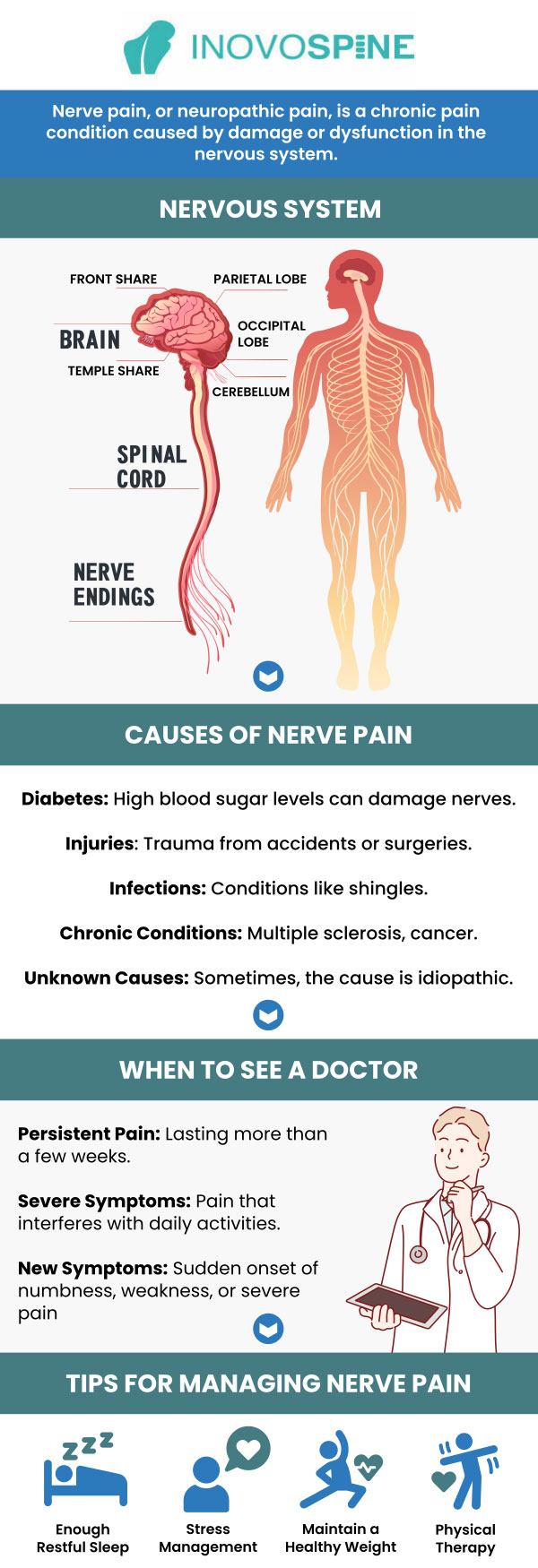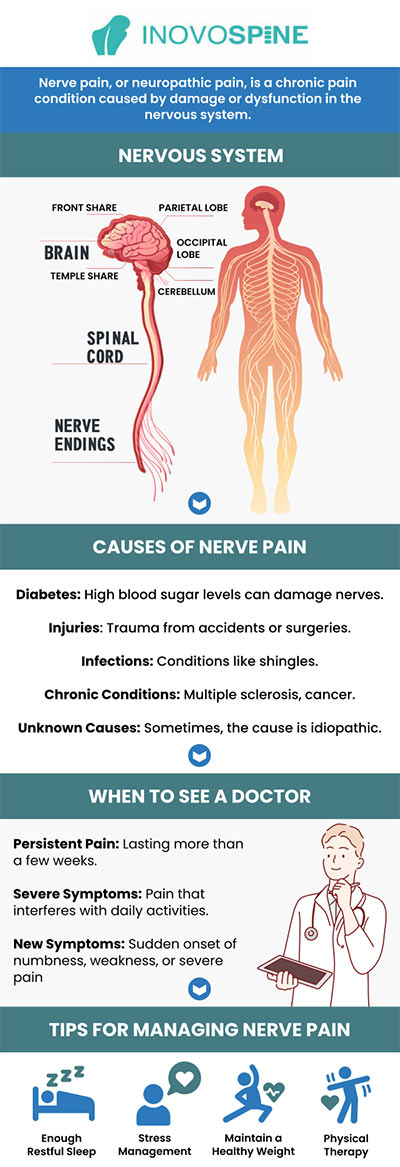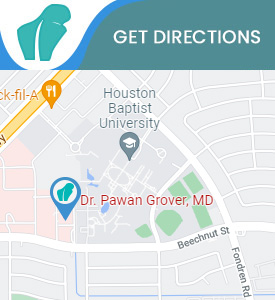Nerve Pain Treatment Specialist in Houston TX
Neuralgia, or neuropathic pain, is another name for nerve pain that arises from an illness that affects the nerves that send signals from your body to your brain. Nerve pain can have a distinct sensation to it. A shooting, stabbing, or scorching feeling is a common description of nerve pain. It can occasionally feel as abrupt and intense as an electric shock. If you are having nerve pain, get yourself checked. It might be caused by diabetes, infection, or possibly a tumor. Don’t take a chance and come to InovoSpine for comprehensive treatment from Dr. Pawan Grover, MDPA. For more information, contact us or book an online appointment. We serve patients from Houston, TX and surrounding areas.




Table of Contents:
What is the most common cause of nerve pain?
What are the most common nerve diseases?
What specialist deals with nerve pain?
How does a neurologist check for nerve damage?
How can Dr. Pawan Grover at InovoSpine provide relief for my chronic nerve pain?
Nerve pain is also called neuropathic pain. This happens when the nervous system is not working correctly or is damaged. Pain can emanate from the brain, spinal cord, or peripheral nerves. Damaged nerves send incorrect signals to pain centers. Nerve function can change in the area that has sustained damage.
Nerve pain can be caused by a number of different health issues. These can include:
– Autoimmune diseases like Sjorgen’s syndrome, rheumatoid arthritis, lupus, Guillain-Barre syndrome, vasculitis, and chronic inflammatory demyelinating polyneuropathy.
– Diabetes is the most common cause of nerve pain. More than half the people who have diabetes will develop some kind of nerve pain.
– Infections are another cause of nerve pain. These include certain bacterial or viral infections, including shingles, Lyme disease, Epstein-Barr virus, leprosy, hepatitis B and C, diphtheria, and HIV.
– Nerve pain can come from inherited disorders.
– Tumors can develop on nerves or push against them causing pain. Some cancers related to the immune system can cause polyneuropathy. These can be a degenerative disorder called paraneoplastic syndrome.
– Bone marrow disorders can cause nerve pain.
– Nerve pain can be caused by things like liver disease, kidney disease, connective tissue disorders, and hypothyroidism.
The diseases that are most directly related to the nerves are peripheral and central nervous system diseases. The most common diseases are epilepsy, strokes, Alzheimer’s, and other dementias, migraine headaches, Parkinson’s disease, multiple sclerosis, brain tumors, neurological infections, and damage caused by traumatic events. Malnutrition can have an impact on forming nerve diseases.
According to the WHO, there are hundreds of millions of people who suffer from nerve diseases and neurological disorders. Over 6 million people die from smoke each year and over 80% of these will happen in poorer countries.
Approximately 50 million people have epilepsy worldwide and 47.5 million deal with dementia, with millions of new cases diagnosed every year. Alzheimer’s disease being the most common cause of dementia.
Additionally, the nervous system can be impacted by numerous infections, both viral and bacterial. Bacterial infections include meningitis and tuberculosis. Viral infections include enterovirus, HIV, West Nile virus, fungal infections, Zika virus, and parasitical infections like malaria and Chagas disease.
If you or someone you know has unexplained symptoms that you think could be related to your nervous system or brain, your doctor may refer you for a neurological exam. The specialist who will be working with this is a neurologist, who treats diseases related to the brain, spinal cord, and peripheral nerves.
If you are experiencing some of the following, you may want to meet with a neurologist:
– Chronic or severe headaches when other common treatments have failed
– Chronic pain may be caused by nerve problems
– Dizziness can be a sign of something serious
– Numbness or tingling could be a sign of stroke or other serious condition, especially if it comes on suddenly or affects one side of the body
– Movement problems like tremors, unintentional jerks, or walking problems can be caused by nerve damage
– Memory problems or confusion
During a neurological exam, a neurologist will use various instruments to measure nerve actions and responses. The neurologist may use lights and reflex hammers to assess nerve function. They will check on motor skills, coordination, balance, and mental status for indicators of nerve damage.
There are other methods of determining nerve damage that can include various forms of imaging tools. Electromyography (EMG) is a means that is commonly used to diagnose nerve damage. The EMG records electrical activity. Abnormal electrical activity indicates that nerve damage may be present. If you know someone who is showing symptoms that could be related to nerve damage, call InovoSpine in Houston.
Dr. Pawan Grover, MDPA, a leading nerve pain treatment specialist at InovoSpine in Houston, TX, offers personalized, advanced treatments to help individuals manage and relieve chronic nerve pain. Whether your nerve pain is caused by conditions like sciatica, diabetic neuropathy, or herniated discs, Dr. Grover specializes in minimizing discomfort and improving your overall quality of life with innovative, minimally invasive procedures.
At InovoSpine, Dr. Grover uses treatments such as spinal injections, nerve blocks, and regenerative therapies that target the source of nerve pain, reduce inflammation, and promote healing. These techniques are designed to deliver lasting relief without the need for major surgery, allowing you to recover faster and with less risk.
Dr. Grover takes a comprehensive approach to nerve pain management, carefully assessing each patient’s condition to create a customized treatment plan. His goal is not just to alleviate pain, but to help patients regain mobility and restore their ability to live pain-free. For more information, contact us or schedule an online appointment. We serve patients from Houston TX, Hedwig Village TX, Meadows Place TX, Missouri City TX, Hunters Creek Village TX, Spring Valley Village TX, and surrounding areas.

Additional Service You May Need
- Regenerative Medicine
- Spinal Arthritis
- Diagnostic Mapping
- Interventional Pain
- Minimally Invasive
- Spine Pain
- Radiofrequency Ablation
- Spinal Cord Stimulation
- Physical Rehabilitation
- Facet Joint Pain
- Herniated Discs
- Muscle and Joint Pain
- Post-Laminectomy Pain
- Myofascial Pain
- Peripheral Nerve Pain
- Regional Pain Syndrome









